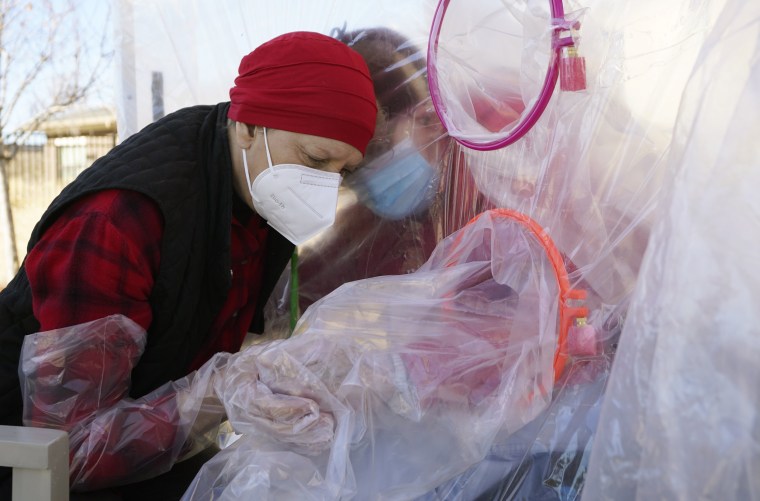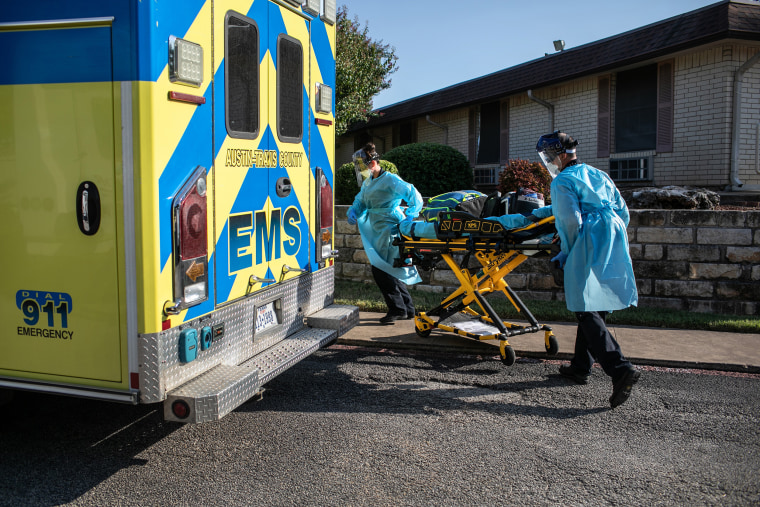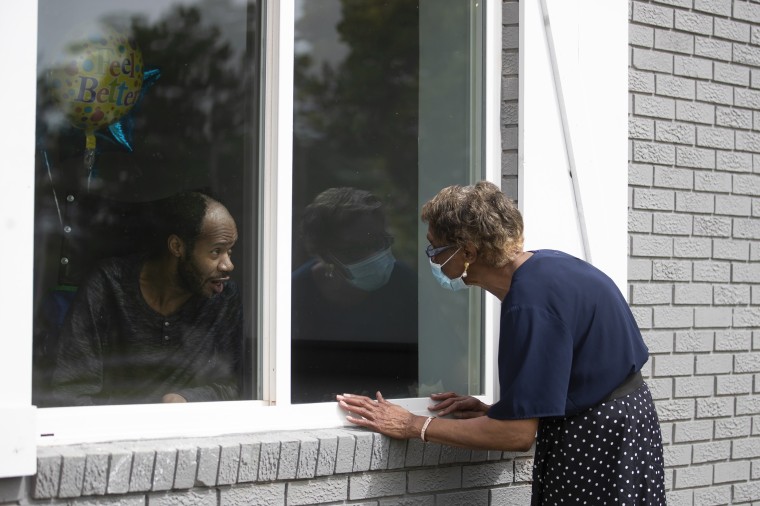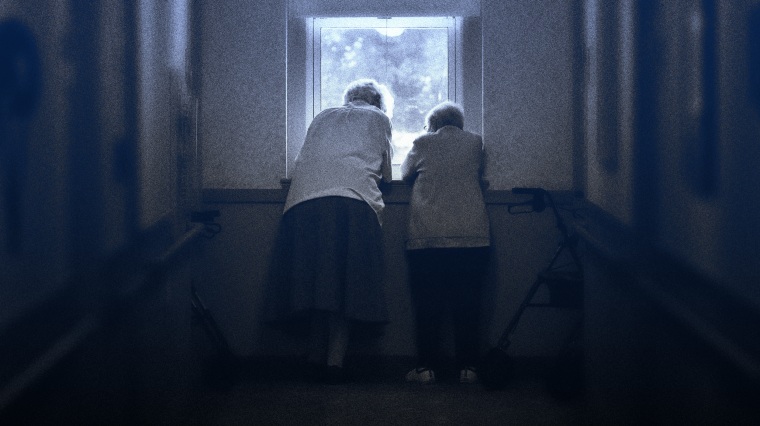Nursing home residents and staff members will be among the first people in the United States to receive the coronavirus vaccine.
But there are significant challenges to overcome before the vaccine is broadly administered to this high-risk population, which has been hit harder than any other by the pandemic.
The federal government has contracted with CVS and Walgreens to distribute the vaccine to long-term care facilities and open on-site clinics to vaccinate residents. That’s no small logistical feat, but it’s far from the only hurdle this mass vaccination effort faces.
Each state has to figure out where long-term care staff members must go to get vaccinated; some may have to go off-site. Public health officials are also confronting hesitancy among some workers, as well as residents and their family members, about getting a new vaccine that some are concerned has not been sufficiently tested on elderly, medically frail people.
And even the many nursing home residents and workers who want to be vaccinated as soon as possible could face a wait in some states. Vaccine clinics are expected to be up and running inside long-term care facilities by the end of December, pending federal approval, according to the American Health Care Association, an advocacy group for long-term care providers.
But initial supplies won’t be enough to cover all the nation’s estimated 21 million health care workers and 3 million long-term care residents — the two groups a federal advisory panel recommended prioritizing — forcing states to decide who should go ahead of the others.
While nearly all states are making long-term care residents and staff a top priority, their vaccine distribution plans vary. New York, for example, announced Thursday that its initial batch of 170,000 doses will go to nursing home staff members and residents, while Kentucky said its first shipment of the vaccine will be split between hospitals and long-term care facilities.
By contrast, Utah will send the vaccine to front-line workers in five large hospitals first, and long-term care residents and staff will be vaccinated afterward, along with other hospital and health care workers. And Mississippi is planning to vaccinate police, firefighters and other first responders, in addition to hospital workers, before people in nursing homes.
“There has to be an infrastructure in place before helping others,” said Liz Sharlot, a spokeswoman for the Mississippi State Department of Health.

Groups representing long-term care facilities are adamant that their residents and staff should be at the very front of the line, given their vulnerability to the virus. Long-term care facilities were linked to more than 100,000 deaths from Covid-19 as of November, according to the Kaiser Family Foundation, a nonprofit research organization, about 40 percent of the total deaths from the virus in the U.S. at that point.
“If long-term residents and those employees aren’t vaccinated first, it is an enormous public health blunder,” Mark Parkinson, president and CEO of the American Health Care Association and the National Center for Assisted Living, which represent long-term care facilities, said Monday on a press call. If states put others first, “it doesn’t mean the vaccines will be wasted,” he added. “But the single best way to very quickly reduce the number of Covid deaths is to get the population vaccinated who is dying.”
Full coverage of the coronavirus outbreak
The Centers for Disease Control and Prevention is expected to endorse the recommendation from the Advisory Committee on Immunization Practices to offer vaccines to long-term care facilities and health care workers first, but the CDC’s guidance is not binding, so states can pick other groups to prioritize.
“These are guidelines that come from the federal government, but states don’t have to adhere to them. They can see what the circumstances are on the ground and make decisions on the fly,” Josh Michaud, associate director for global health policy at the Kaiser Family Foundation, said. “It’s complicated.”
State officials are still working out some other key details. While many states said that staff members of long-term care facilities would be vaccinated at their workplaces, workers in other states may have to travel to a hospital or other site for the vaccine, especially if they are prioritized ahead of long-term care residents, state health officials said.
Despite the remaining hurdles, Dr. Moncef Slaoui, chief adviser to Operation Warp Speed, which is spearheading the Trump administration’s effort to develop and distribute the vaccine, said Sunday on CNN that he expects all nursing home residents and workers to be immunized by the middle of January.

Bill Borrelle, who runs a Facebook group for family members of nursing home residents, believes the vaccine will be life-changing for his 95-year-old mother, who is legally blind and has suffered from weight loss, increased dementia and other health problems since her assisted living facility in New Jersey stopped in-person visits.
“It is the long-awaited hope for our loved ones and our family — it seems to be the only way we’re going to get back in,” said Borrelle, who has pushed for essential caregiver visits during the pandemic. “This is a no-brainer.”
But while many are eager to get the vaccine, others are still hesitant. Nursing home advocates stressed that transparency from government officials and administrators about the vaccine and intensive outreach will be critical to addressing safety concerns, especially since residents and staff will be among the first people to receive it outside of clinical trials. The CDC is spearheading its own effort to increase vaccine confidence among all health care workers, describing their concerns about a new vaccine as “understandable” and stressing the need to address them “with empathy and transparency.”
When the federal government approves the vaccine, it will be under an emergency use authorization, which means facilities cannot mandate that staff members or residents receive it, the American Health Care Association said in a statement. “So the focus needs to be on educating staff and residents about the importance of vaccines,” the group said.
The Food and Drug Administration, which is reviewing the Covid-19 vaccine candidates for emergency approval, directed questions to the Department of Health and Human Services, which did not respond to requests for comment.
The clinical trials for both the Moderna and the Pfizer vaccines under FDA consideration both included adults ages 65 and older, and found the vaccines to be effective in that population with only mild or moderate side effects. But the underlying trial data has not been released, and the vaccines were not tested on a group of long-term care residents, who are older and suffer more serious underlying medical conditions than the general population, as well as impaired cognition and functioning.
The omission prompted one member of the federal advisory committee to vote against its recommendation to prioritize long-term care residents in the first round of the vaccine, which uses a new technology called messenger RNA.
“It’s a huge problem because there isn’t data on this population,” said Dr. Louise Aronson, a geriatrician and professor at the University of California, San Francisco. (Neither Moderna nor Pfizer responded to requests for comment.) The FDA is scheduled to release a detailed evaluation of the Pfizer vaccine trials on Tuesday, which is expected to include more data about the vaccine’s impact on older participants.
“There are concerns about being an early adopter — will this be safe for me, if I am medically fragile?” Susan Dooha, executive director of the advocacy group Center for Independence of the Disabled, New York, said. “The messaging campaigns are going to have to really respond to this — we are legitimately afraid.”

Despite the unknowns, Aronson advises long-term care residents and their families to weigh the potential risks of the vaccine against the benefits of getting immunized early, given the deadly impact of the pandemic, both through the virus itself and the prolonged isolation from nursing home lockdowns.
“I tell them I think they should consider it. The more miserable a person is, the more they might want to take the risks upfront. If they’re doing well right now, they might want to wait,” she said, noting that long-term care residents may have a harder time managing the short-term side effects. “But I don’t think there is an easy answer.”
Other medical experts have been more adamant about encouraging long-term care residents to get vaccinated.
“There is no reason to suspect there are going to be any further complications from it,” Dr. David Gifford, chief medical officer for the American Health Care Association, said on Monday’s press call. “This is a deadly virus in this group. As a physician, I am not worried at all about recommending this vaccine to someone in our group out there.”
Download the NBC News app for full coverage and alerts about the coronavirus outbreak
Medical experts stressed that it was critical to convince long-term care workers to be vaccinated quickly, given their hands-on care of residents. While nursing home workers have been on the front lines since the earliest days of the pandemic, witnessing its deadly impact on their patients and colleagues, some say they are skeptical about a vaccine that has been fast-tracked.
Sheena Bumpas, 38, yearns for a return to normalcy for the residents she feeds, dresses, bathes and monitors as a certified nursing assistant in Oklahoma. But she is undecided about whether to get vaccinated and says it’s unclear where she and her colleagues should direct their questions.
“I don’t just want to hear from the CDC,” said Bumpas, a board member for the National Association of Health Care Assistants, an advocacy group for caregivers. “I want a scientist to stand up there and talk to us in layman’s terms.”
Stuart Almer, CEO of Gurwin Jewish Nursing & Rehabilitation Center in New York, said that he hasn’t communicated formally with his employees or residents about the vaccine yet, as he still hasn’t received any guidance from federal or state authorities regarding the timing, requirements or other details of the rollout.
But after 61 residents at the facility died and others endured months of painful isolation, Almer is hopeful about the months ahead. “We are all cautiously optimistic that this could be the answer,” he said. “If the vaccine gets us there, safely, then it is a very good thing.”

